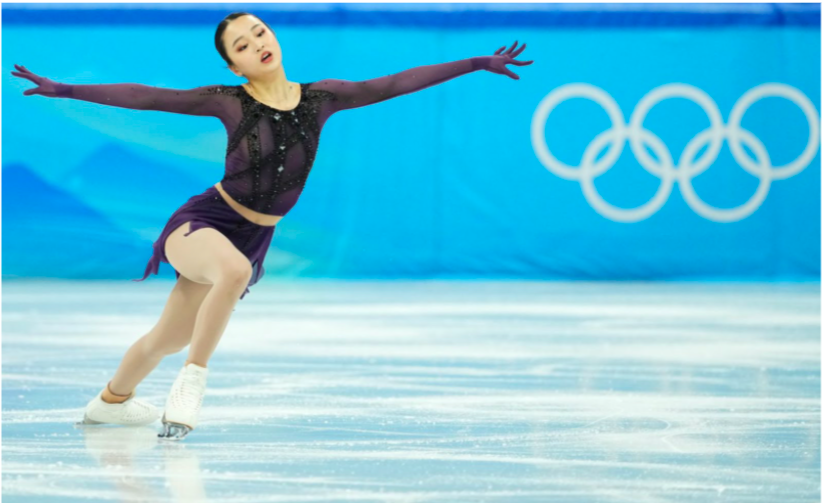Chinese Athlete Attacked for Renouncing American Citizenship
Zhu Yi performs her routine during the women’s short program team event at the 2022 Winter Olympics in Beijing.
February 18, 2022
A large expanse of ice glitters under the row of gleaming headlights. The audience stares, expectant eyes glued to the skating rink with enthusiasm. Nineteen-year-old figure skater Zhu Yi races across the ice, heart pounding with anticipation. Months of endless falls, grueling workouts, and early-morning practices finally culminate in the moment where it all matters: the opportunity to achieve what millions could not. Like Zhu, hundreds of athletes from across the globe have converged in Beijing, China to compete in the 2022 Winter Olympics, hoping to surpass the impossibly high gold standard.
However, simply qualifying as an Olympic athlete is no easy feat, let alone earning a place on the podium. Limited spots force large countries, such as the United States, to filter through potential candidates unsparingly, selecting only those that display top-notch talent. This killer competition has served as the principal factor behind the decision of several American athletes to leave their home country, favoring a chance at a foreign Olympic team instead.
“Once the [Olympic Committee] approves the pool of athletes that qualify, the country then nominates who they want to send. In some instances a coach may pick one athlete over another, so that athlete might have a better shot with another country,” Elizabeth Swaney, American free-style skier, said in an interview with Bloomberg.
Zhu, the California-born daughter of two Chinese immigrants, is one such athlete. Aiming to enter as a member of the Chinese Olympic team, Zhu relinquished her U.S. citizenship in 2018, moving to Beijing to train as a figure skater.
Her actions have not gone without controversy, drawing mixed opinions from both Americans and the Chinese.
“These athletes have a kind of really fine tightrope they have to walk to navigate. It’s an impossible Catch-22 for them to be able to please both expectations from both countries,” Christina Chin, co-editor of Asian American Sporting Cultures, said.
Last week, Zhu competed in the women’s short program, stumbling through her opening combination and crashing into the walls of the skating rink. Zhu then proceeded to the free-skate event, a part of the women’s team competition, where she fell twice during her routine. Her low scores dropped the Chinese team from third to fifth place.
Zhu left the skating rink in tears, disappointed with her performance and dissatisfied with her efforts to represent China. Chinese athletes are notoriously burdened with the strain of accomplishing Olympic excellence, a result of the country’s perception of medals as a symbol of national strength.
“I’m upset and a little embarrassed. I guess I felt a lot of pressure because I know everybody in China was pretty surprised with the selection for ladies’ singles and I just really wanted to show them what I was able to do but unfortunately I didn’t,” Zhu said after the competition.
The Chinese public ruthlessly flocked to Weibo, a popular Chinese social media platform, expressing their blatant displeasure at Zhu’s unfortunate debut. Many posted critical comments, questioning Zhu’s loyalty to the country and highlighting her lack of cultural ties to China.
“Please let her learn Chinese first before she talks about patriotism,” one Weibo user wrote.
Others accused her of accepting a position on China’s Olympic team under unfair circumstances, alleging that this was only possible under the influence of Zhu’s father, a prominent computer scientist.
However, despite the backlash she has received, Zhu appears determined to cherish her Olympic experience, searching for the positive light in what seems to be a sea of misfortune.
“It’s all about the journey. I persevered through years of adversity, and came out a stronger person. I am an Olympian; no one can take that away from me,” Zhu said.

